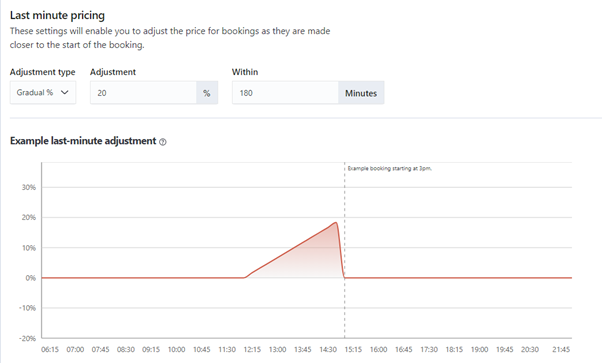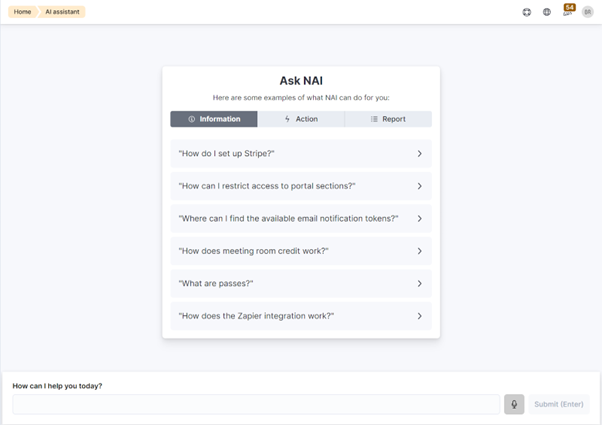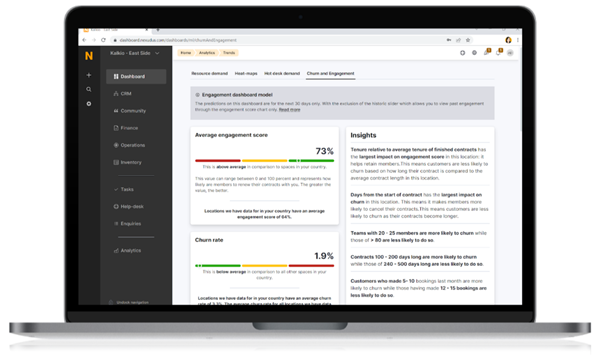Friend Not Foe: The AI Advantage in Workspace Management
AI has captured the cultural zeitgeist in a way other tech could never aspire to - more than IoT, more than cloud computing, and oddly even more than nanotech, considering the possibilities it affords.
With every new technology comes a reasonable fear - will it cost me my career? If you look at the conversation around generative AI and jobs, this is a legitimate concern, with 50% of employees in one survey saying they don’t trust what AI might do to their future.
When AI first emerged, the general consensus was that it would never replace human creativity. In 2024, with generative fills in photoshop, LLMs reducing customer support headcounts and DALL-E creating strange, beautiful and sometimes haunting imagery, we’re in a bind. We seem to be rapidly approaching a point where our creative abilities are indistinguishable from that of artificial intelligence.
For workspace providers, who pride themselves on cultivating meaningful relationships with their professional communities (and use a lot of creative ways to do it) AI can very easily be perceived as a foe, rather than a friend. In this piece, we’re going to present an alternative vision for AI, positioning it as a tool, not a threat. Let’s explore.
"The seasoning, not the dish."
At Nexudus, we’ve been pioneering, championing and implementing AI since before it was a trend. Our ethos is to be on the cutting edge of innovation, without ever sacrificing the human element. So what did we do?
We built AI that would collaborate with us, rather than supercede the talented space management teams we design for. The best design philosophy, when implementing AI tools within operations, is to think of them as spice that enhances the flavour of your offering, not the offering itself.
An example of this is our dynamic price modelling, which is powered by AI.
We allow workspace owners and operators to fully control the extent of AI implementation within their pricing, from adjusting percentages to time limits and even whether they want the functionality within their operations at all.
This puts the control securely within an operator’s grasp - they can utilise stand pricing or switch to capacity-based pricing, toggle on demand-driven pricing or even set up rules for last minute bookings. The AI’s role within this process is to process a lot of data at once to create the best pricing scenario, as informed by human direction.
Companion, not competition.
In an article authored by Peach VP of product Tej Rekhi, he compares the evolution of computing to AI as the switch we made from radio to television, and how we changed our opinion of social media’s rampant rise to instead ride the wave. He believes that a good practice is to start with applications that help humans flourish.
We’re very aligned with this outlook ourselves, and carefully created a AI-powered support assistant that could help our customers (and their customers!) access support from Nexudus’ system, and from a space providers own systems - all in real time. We designed Nexudus AI (NAI) not as a replacement for support, but instead as a speedy tool to help in an instant with common support queries. This opens up a support team’s schedule to deal with complex queries, follow ups, knowledge bases, reading materials and so much more to benefit the customer.
We’ve also built some curiosity into NAI, which learns from questions and queries to optimise its responses and constantly improve the support it provides. If you’re interested in what NAI can do, here are some highlights:
- NAI can answer your questions - if you wanted to know how to set up a pay as you go (PAYG) pass for members, NAI could show you all the steps. All you have to do is ask.
- Similarly, if you need to create records or pull reports, just tell NAI what you want to include in the report, define some dates (yes it responds to follow ups too!) and you’ll have your data in no time.
- Finally, NAI can create a record in your Nexudus system. So if you want to be reminded about giving someone a tour of your space tomorrow, NAI can set up a reminder for you to streamline your workflows for the day.
Tomorrow’s workplace, today.
Jobs change and evolve dramatically over time, but work is forever. Especially a workspace. Even the pandemic couldn’t move us all back home for good, because the value of a workspace - the social connection it creates, the impromptu collaboration, even the in-person meetings, all play a part in making us feel connected to our professions. With AI set to create 97 million more jobs, we have a crucial opportunity to utilise its power for optimising our spaces (again, all based on data humans provide it) to create more utopic work environments.
While this particular article by Insightful Environments explains how AI can aid collaboration, safety and wellbeing within workspaces, we like to think beyond the more intangible aspects to how it can be utilised today, within day-to-day operations, to create more sustainable, user-centric environments that are easier to manage and can boost revenue.
With this in mind, we developed AI powered Churn and Engagement Dashboards within our platform, to allow space owners and operators insight that goes beyond visible criteria like location and facilities. Using AI, operations teams can now get a data-driven understanding of what space users value, and discover the as-yet-hidden metrics that lead to a drop in engagement (or worse, churn).
The tip of the iceberg.
As we mentioned at the top, Nexudus is not new to AI. We’ve long found ways to enhance the abilities of some of our key offerings with advanced, real-time computing. This blog is the tip of the Nexudus AI iceberg, if you will, so if you want a full breakdown of where it features in our mix of workspace solutions, you’ll find this piece written by our CEO does just that. For all AI related questions, queries, updates and musings, keep it locked to Nexudus’ blog and sign up to our monthly newsletter if you haven’t already. We’ll see you in the next one.
At Nexudus, we’re passionately building technology that provides space owners and operators with fully customisable, easy-to-integrate digital solutions for their spaces, across coworking, commercial real estate, hospitality and beyond. Since 2012, our award-winning technology has helped workspace owners and operators in over 90 countries digitally transform their spaces, manage them more efficiently, provide exceptional customer experiences and gather advanced analytics for better decision-making.
Related stories
New in Nexudus: Reduce no-shows & improve team bookings in your coworking space.
Meeting rooms are at the heart of collaboration in coworking spaces. Whether it's a brainstorming session, a client meeting, or a team catch-up, having a simple and efficient way to book and manage meeting rooms makes all the difference. But let’s be honest—there’s always room to improve the experience for your members.
Unlock New Revenue Streams with Our New Virtual Offices Module
The popularity of remote and hybrid working has prompted many organisations to rethink the way they utilise office space. Many have swapped their large, static HQs for more flexible satellite solutions that can accommodate a disparate workforce.
ViDA Compliance Guide: 8 Essential Steps for Coworking Spaces in the EU
Now that 2025 has arrived, the European Union's VAT in the Digital Age (ViDA) initiative is becoming a key topic for coworking spaces operating in the EU. But don’t panic—ViDA will be introduced gradually, with key changes taking effect from 2028. This major VAT reform aims to modernize tax reporting, combat fraud, and streamline compliance through mandatory e-invoicing and real-time digital VAT reporting for certain transactions.
Harnessing AI to Help Coworking Operators Understand Their Communities Better
After more than twelve years in the coworking industry, we’ve seen the movement evolve at an incredible pace, especially in recent years. Spaces have grown larger, making it harder for operators to truly connect with their communities. At the same time, expectations for higher service standards and increasing competition mean that creating tailored experiences and fostering long-term member engagement is more important than ever.
What Is Workplace Management and Why Does It Matter?
There has always been a need for workplace management – the process of organising and optimising physical spaces, resources, and operations to support people’s needs. But, as 28% of UK working adults were reported to work in a hybrid capacity last autumn (by the Office for National Statistics), the question of ‘why workplace management matters’ is more critical than ever. Let’s look at the workplace management benefits for your operations.
Exploring Coworking Software in 2025: 10 Key Nexudus Features
From automating daily processes to supporting your team in building a thriving community and boosting revenue for your business – coworking technology couldn’t be more impactful for flexible workspace operations. But with so many tools available, selecting the right tech stack for your coworking business can be overwhelming.
Unlock Your Team’s Potential with the New Nexudus Academy
As the coworking industry continues to grow and evolve, so does the Nexudus platform. We always strive to develop new features and enhance existing ones to make your job easier. When new features are introduced, there is a need to learn how to best leverage them for your space.
From Startup to AI-Powered Coworking Software Company: The Nexudus Journey
When we first launched Nexudus, we were a small, tightly-knit team wearing multiple hats—from sales to implementation and customer support. In those early days, if a customer had a question, there was a good chance that the person answering it was also the one who had built that particular feature.
Data-Driven Decisions: Using Industry Data to Shape Your Coworking Strategy
Coworking is becoming an increasingly competitive industry, making it more crucial than ever to make the right decisions. The key to success lies in having access to accurate and relevant information, which enables informed decision-making.
New Feature! - Marketing Insights for Nexudus (beta)
At the core of every thriving coworking space is its community. This has been true since the early days of the coworking movement, and it still holds today.

